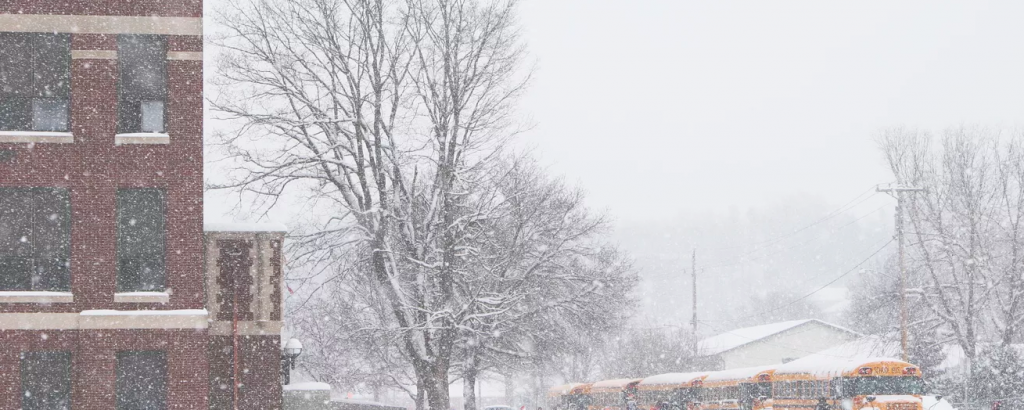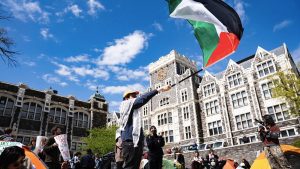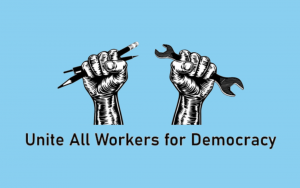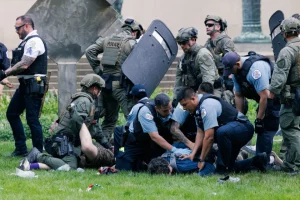Originally published in Chalkbeat
I ease my 15-year-old Civic hybrid into the parking space, adjust my mask, and open the door into the morning dark. I’m wearing a 35-year-old camel’s hair overcoat. Underneath I have on a black cardigan that belonged to my dad. It’s 6:30 a.m.
As soon as I step up to the entrance door, a loud gust smacks me, knocking me back a little.
On the last Friday in January, the coldest morning in over a year, our entry doors are wide open, airing out the building. When you walk past one of these doors you shiver; the notices on hallway bulletin boards flutter like pennants on a warship.
I get to my classroom. In the last few weeks I’ve enjoyed a little more heat from the radiator in the early morning. It usually fades by 11, but those early hours are welcome. As I sip black coffee brewed in my classroom, I read David Brooks criticizing teachers for insisting on safety precautions as a condition for return to in-person learning. He seems like a nice guy, and he may have a point, but I bet he typed the column someplace warm.
By the time the students arrive, I’ve got the windows open, as do all of my colleagues. My smallest class has 20 students on its rolls, but with many students choosing to continue learning from home, I have no more than eight students in front of me, and a couple of my classes have no more than two.
Vast suburban athletic fields extend outside my New Jersey classroom. The classroom is on the ground floor in a sort of V-shaped crook of the building. This particular Friday, the noontime temperature hits 34, and yet a relentless wind moans, surging from the first-base coach’s box across the infield, the outfield, the soccer field, the practice football field, whipping around that V and in through the classroom windows. The cold floor steadily numbs your feet.
We’ve adopted winter rules, like in golf. I’m so old-school that I’ve never allowed students to wear hats and hoods in class. But now everyone is permitted a head covering in class.
If you’re reading this in Anchorage or Duluth, St. Johnsbury or Bangor, you’re probably rolling your eyes. Some people just don’t know how to handle a little cold, you’re no doubt saying. I won’t deny it, and I’ll add that you all deserve medals — and raises — if this is how you teach in the north country.
I stood in class one blustery day and thought: I’m 64 years old, I’ve been doing this for 41 years, I’m teaching five kids in person, and I’m shaking like a leaf. I thought of the now-retired friends who taught me how to teach, and sensed that if they could see me now, most of them would get a good laugh. And that made me smile, thinking of them, chuckling at me as I try to teach our nation’s history and its democracy to an endearing, embattled group of teenagers who’ve seen almost a year and a half of their high school careers damaged in profound ways.
We study about 10 miles away from a place called Jockey Hollow, a magnet for hikers and woods walkers that’s part of the Morristown National Historical Park. Washington’s army spent the hard winter of 1779-80 in those wooded hills, denuding them of trees to build huts to withstand the worst winter of that century. But before the huts got built, Continentals would some mornings awaken under snow. They resorted to eating dogs, tree bark, shoe leather. They weren’t getting paid. Few deserted.
What we’re doing isn’t close to that. But in some remotely similar way, my colleagues and I take quiet pride in continuing to show up, open the windows, deliver the best instruction we can to the tiny number of students in attendance while also serving the larger crowd coming to us from their homes. My admirable colleagues include the maintenance man who works to keep the school as warm as possible, the custodians who disinfect it, the secretaries who do their work behind plexiglass, and the administrators who have faced immense pressure since March 13.
By 11:15, I’m taking lunch at my desk. The radiator doesn’t appear to be blowing warm air, so I’ve got an old red and white stadium blanket, vintage 1978, over my legs. I’ve closed the windows, as it’s just me in the classroom. But periods seven and eight will be coming in soon, and I’ll soon raise the windows to keep these wonderful kids and me from catching the virus that has taught us all about how little we are in control.











